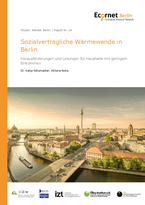
IÖW-Projects
Every year the IÖW works on approximately 60 research projects. Since its existence the instiute has completed more than 600 projects.
Enable advanced search
44 running Projects // 357 Projects in total
Social and environmental heat transition in Berlin A project of the joint program ‘Knowledge. Transformation. Berlin’ by the research partnership Ecornet Berlin
Alternative Economies in and for Berlin A project of the joint program ‘Knowledge. Transformation. Berlin’ by the research partnership Ecornet Berlin
Green City of the Future – Climate-Resilient Neighborhoods in a Growing City Subproject: Analysis of social and economic aspects of green infrastructures
Change in perspective Bioeconomy – for more sustainability A dialogue project in the science year 2020/2021
Suburban Heat Shift Innovation district heating in agglomeration belts using the example of of the existing quarter “Leeste”: Project phase 1
Evaluation and advancement of CSR reporting
gARTENreich Preferences and constraints for biodiversity conservation in home gardens, project phase 1
Holistic Biodiversity Management in Construction Materials Industry (GiBBS) Strategies and Measures for Biodiversity Protection in Context of Resource Extraction, project phase 1
Development of a service to support the adaptation to climate change (KlimAdapt) by extending the knowledge base, specification and implementation support
Corona and Sustainability In search of a new balance between market, state and civil society for a resilient society
Prospective synergistic planning of development options in regiopols for the example of the agglomeration area of Rostock PROSPER-RO
Climate Protection Potential of Digitalization Potentials of digitalization for the reduction of greenhouse gas emissions in the energy sector
Advisory opinion on the definition of social economy enterprises (Sökon)
Entwicklung einer Wärmestrategie für das Land Berlin
ReCap – Capping Macro Rebounds Reconsidering the Role of Energy and Resource Productivity for Economic Growth, and Developing Policy Options for Capping Macro-Level Rebound Effects








